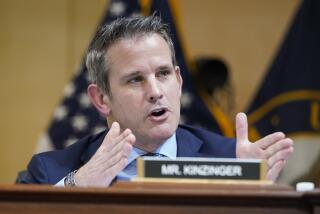Green Candidate Isn’t Yielding to Nader
- Share via
Ralph Nader faces an unlikely rival in his latest effort to boost his presidential campaign: David Cobb, a lawyer from Northern California.
Cobb sounds the same policy notes as Nader: Both oppose the war in Iraq and support universal healthcare, stronger environmental protection and stricter regulation of business. Both want to change the two-party system, and both want President Bush defeated.
Cobb has even worked as Nader’s political ally. He helped build the Green Party’s organization in Texas when Nader first ran as the group’s presidential standard-bearer in 1996. Then he served as the party’s general counsel and managed Nader’s Texas campaign when the consumer advocate was the Green nominee in 2000 -- a candidacy many Democrats say cost Al Gore the White House.
This year, Nader’s bid for the presidency as an independent again worries Democrats. On Saturday, he hopes to win the Green Party’s “endorsement.” (Because he is not running as a Green, the party cannot formally nominate him.)
But standing in his way is Cobb, 41, who argues the Greens would be better off nominating one of their own -- him.
“My primary goals are to grow and build the Green Party,” Cobb said. The party “is here to stay,” the Eureka resident added, while “candidates will come and go ... even candidates as important and famous as Ralph Nader.”
Some doubt that argument will work for Cobb. Nader, said Green Party spokesman Scott McLarty, “has what David Cobb doesn’t have, which is a great big name.”
As Greens gather in Milwaukee for their convention, the Nader-Cobb race offers them not only the choice between a prominent public figure and a virtual unknown, but competing visions of what the party’s goal should be in the 2004 election.
Cobb wants to transform the Greens into a potent force in American politics. And the way to accomplish that, he says, is to have a committed party member promoting its message and cultivating its grass roots.
Nader, 70, is seeking the party’s endorsement as part of his effort to reshape the country’s political landscape into one where multiple parties can thrive.
Nader’s campaign is working to put him on as many state ballots as possible, regardless of the impact on the Democratic campaign against Bush. A Green Party endorsement could help him gain ballot access in several of the race’s most closely contested states, including Michigan, Wisconsin, Oregon and New Mexico.
Cobb’s campaign, in contrast, would target the roughly 40 states not labeled as battlegrounds -- what many have termed a “safe state” strategy. Emphasizing his message in firmly Republican or Democratic territory, Cobb wants progressives to vote Green and “invest” in its long-term growth.
In states viewed as tossups, Cobb would urge progressives to vote their consciences, whether that means Sen. John F. Kerry, the presumed Democratic nominee, or a more left-leaning alternative.
Cobb’s selective approach doesn’t sit well with Nader supporters.
The Nader campaign “obviously disagree[s] with the safe-state strategy,” Nader spokesman Kevin Zeese said. “We think that’s a recipe for disaster for any third party to kowtow to the Democratic Party or any party.”
Some Greens also are skeptical. “I’m not sure the Cobb strategy will build the Green Party,” said Carol Miller, co-chair of the New Mexico Green Party.
Nader’s selection of Peter Camejo, a prominent Green activist and Northern Californian, as his running mate is expected to increase Nader’s support among the party faithful.
“Choosing Camejo obviously [helps] in the Green contingent,” said Beth Moore Haines, a spokeswoman for the California Green Party.
Still, Cobb goes into Saturday’s convention with an edge in delegate support. Of the roughly 400 votes needed to win the nomination, he has about 240, party officials say. Nader has about 65 backing his endorsement bid. But Camejo’s supporters, numbering about 115, are expected to swing his way.
Cobb’s commitment to the Green Party stems in large part from his experiences growing up poor in the village of San Leon on Texas’ Gulf Coast. He and his three brothers shared a bedroom in an 800-square-foot house their father built; his childhood chores included emptying the five-gallon bucket that served as a family toilet for several years.
“I’ve seen up close and personal how the rich fat cats abuse the working poor of this country,” Cobb said.
He waited tables, worked on shrimp boats and in construction and promoted rock shows before attending the University of Houston, where he earned undergraduate and law degrees. His activism emerged in college, when he volunteered for the Rev. Jesse Jackson’s 1984 campaign for the Democratic presidential nomination.
He became a Green in 1996. “I realized the Democratic Party is the place where genuine progressive politics goes to die,” he said.
Now working as a community activist affiliated with Democracy Unlimited of Humboldt County, Cobb launched his presidential bid in January and has raised between $35,000 and $40,000. Nader has amassed nearly $1 million.
To make ends meet when campaigning, he flies on budget airlines, takes public transportation and stays in friends’ homes.
Cobb shrugs off the spoiler label given the Greens by many Democrats.
“What Democrats call spoiling, Greens call participation,” he said. “We are going to exercise our democratic right to participate in elections. And if our participation is causing spoiling, it just demonstrates that the voting system is fundamentally flawed.”
More to Read
Get the L.A. Times Politics newsletter
Deeply reported insights into legislation, politics and policy from Sacramento, Washington and beyond. In your inbox twice per week.
You may occasionally receive promotional content from the Los Angeles Times.










